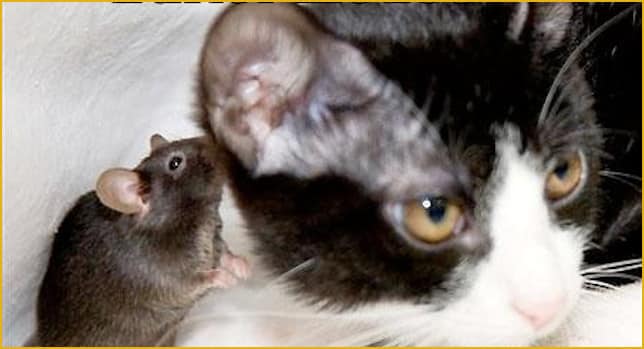
Very often, homes where children live also contain cats. Cohabitation with cats is one way to catch toxoplasmosis, which is thought to infect from one-quarter to one-half of all humans. It can invade a person who eats undercooked meat, drinks contaminated water, works in a garden, eats vegetables that have not been sufficiently washed, handles cat excretions, plays in a sandbox, or lets cats walk on kitchen tables and counters. The toxoplasma gondii parasite then takes up residence inside the person, and mostly does not do much else. Or does it?
Let’s look at the relationship between the parasite and its frequent host, the mouse or rat. T. gondii can sexually reproduce only inside of a cat, so when it winds up in a rodent, it knows that it needs to get back into a feline. It tinkers with the mouse’s brain and sets up a “fatal attraction” trigger, making the mouse sexually aroused by the odor of cat urine.
The mouse loses all fear, and gets silly and dances around in front of the cat as if daring it to pounce. Enough mice end up inside of cats to start the process all over again. Sometimes, the plan fails, because the reprogrammed rodent becomes so bold and aggressive, the cat changes its mind, as seen in this one-minute video clip.
Our bodies
Inhabiting people, the parasites can asexually reproduce, form cysts around themselves, and stay forever. Mostly Toxo is basically latent, supposedly, but on the other hand, it has been accused of warping bodies and behavior in a bewildering variety of ways.
Toxoplasmosis may exacerbate the effects of epilepsy, Alzheimer’s disease, autism, neurodegenerative disease, and other chronic conditions. It is why pregnant women are warned not to clean out cat litter boxes. Mothers with latent Toxo might have babies whose motor development is delayed. The parasite has been investigated relative to weight gain and thyroid disease in pregnancy, along with gestational diabetes mellitus, and the fetus’s height, body mass index, and waist-hip ratio — so there is a childhood obesity link.
Our selves
The parasite is also suspected of meddling with our mental and psychological health. Among the qualities it seems to affect are intelligence, cognitive function, novelty-seeking, learning ability, personality changes, schizophrenia, bipolar disorder, and obsessive-compulsive disorder.
According to legend, a medical professional noticed that motorcyclists who show up in the Emergency Room have a tendency to test positive for toxoplasmosis. Not surprisingly, Toxo has also been linked with altered reaction time, impulsivity, heightened extraversion, and car accidents caused by reckless speeding. It is accused of making people less conscientious and more prone to rage disorder, poor impulse control, and suicidal behavior.
Men in particular tend to become “introverted, suspicious, oblivious to other people’s opinions of them, and inclined to disregard rules.” Maybe this explains the mindset that leads people to recklessly gamble with COVID, refusing masks, vaccines, and any other form of caution. The Toxo has gotten to them.
Our coronavirus
A study that has not yet been peer-reviewed, or published with the imprimatur of a respected journal, may yet contain a pertinent warning, especially when it originates with a researcher who has published scores of other papers, many of them having to do with the same parasite discussed here. That researcher is Jaroslav Flegr of Charles University in Prague, who is ruthlessly on the trail of relationships between T. gondii and various human malfunctions and ailments. He says,
In the past ten years, numerous studies had shown that infected subjects have a significantly higher incidence of mental and physical health problems and are more prone to exhibiting the adverse effects of various diseases.
Toxoplasmosis is known to mess with lung function and the immune system. Since it is a background factor in such a large portion of humanity, the researcher wonders whether it might be an overlooked or ignored factor in susceptibility to SARS-CoV-2. There are grounds for suspicion that feline pets could be a vector for the transmission of COVID within a family. How Flegr reached this conclusion is of course explained in great detail, and it seems possible that a deeper involvement could be hiding in the evidence somewhere. He says,
Because toxoplasmosis affects a large segment of the human population, its impact on Covid-19-associated effects on public health could be considerable.
Your responses and feedback are welcome!
Source: “Rat Shows Cat Who’s Boss,” YouTube.com, 11/08/18
Source: “Jaroslav Flegr,” Orcid.org, undated
Source: “How Your Cat Is Making You Crazy,” TheAtlantic.com, March 2012
Source: “Toxoplasmosis: An important risk factor for acquiring SARS-CoV-2 infection and a severe course of Covid-19 disease,” MedRxiv.org, undated
Image by Paul Anderson/CC BY 2.0

 FAQs and Media Requests:
FAQs and Media Requests: 











